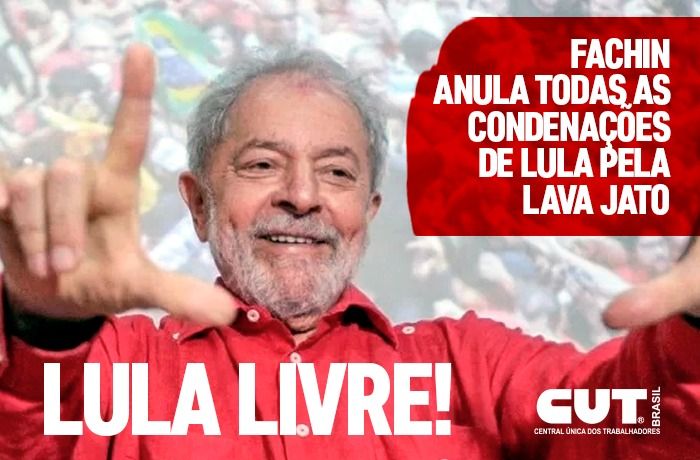UE joins our Brazilian brothers and sisters of the CUT in celebrating the decision of the Brazilian Supreme Court Justice Edson Fachin to invalidate ex-president Luis Inácio “Lula” Da Silva’s convictions and restore his political rights.
Lula’s 2017 conviction on questionable charges of corruption was the culmination of a campaign by right-wing corporate forces, including Brazil’s media, to destroy him and his party, the Workers’ Party (in Portuguese, Partido dos Trabalhadores or PT).

Lula was a factory worker and militant shop floor leader who became one of the founders of the Brazilian metalworkers union (CNM) and the country’s largest labor federation, the Central Única dos Trabalhadores (CUT). In 2002, he was elected president of Brazil as the candidate of the PT, a party founded by trade unions, landless peasants, and other working-class organizations.
The PT governments led by Lula and his successor Dilma Rousseff, who was elected Brazil’s first woman president in 2010, made substantial gains for the Brazilian working class. Their policies lifted 30 million Brazilians out of poverty, created 15 million jobs, and re-industrialized the country into an economic powerhouse (the fifth largest economy in the world). Over 13 years in power the PT also reduced child labor, empowered women, raised the minimum wage, increased real wages by 53 percent, reduced unemployment, and provided social security – the Bolsa Familia – for 47 million Brazilians.
In the words of a CUT leader following yesterday’s decision, Lula “Gave dignity to the Brazilian people.”
In 2016, Rousseff was removed from office by her opponents in Congress in what was widely described — including by UE’s General Executive Board — as a “coup.” In a statement, the UE GEB called Rousseff’s removal from office “an attempt by the enemies of Rousseff’s party, the Workers’ Party … to achieve by other means what they have been unable to accomplish at the ballot box – the removal from power of the country’s working class party.”
In 2017 Lula announced his intention to run in the 2018 presidential elections, but was imprisoned in April of 2018 and at the end of August the Superior Electoral Court ruled him ineligible to run. He had been leading in all opinion polls. Telegram messages between the judge and the prosecutor in his case, leaked by The Intercept in 2019, indicate that prosecutor and judge conspired to convict Lula in order to prevent him from running — and like winning — the presidential race.
UE’s officers denounced Lula’s jailing as “a travesty and crime against the people of Brazil and working people around the world.”
Removing Lula from the race set the stage for the election of the far-right “populist” candidate Jair Bolsonaro, who launched numerous attacks on workers and unions. He lowered the minimum wage and closed down the country’s Ministry of Labor. Upon taking office, he announced plans to privatize almost one hundred public companies, including airports and the state-owned oil company Petrobras. He cut funding for public higher education by 30 percent and has pursued plans to “reform” the country’s social security system by making workers work longer and cutting retirement benefits.
After a worldwide “Lula Livre” (free Lula) campaign supported by unions around the world, Lula was released from prison in November 2019. Yesterday’s decision now clears him to potentially run for president against Bolsonaro in 2022.
